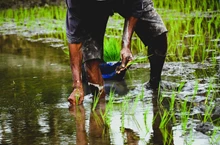
The Nepali government and the World Bank have signed a USD 100 million (Rs 12.7 billion) concessional financing agreement for Green, Resilient, and Inclusive Development (GRID). "The proposed budgetary support seeks to improve Nepal's enabling environment in order to promote green, climate-resilient, and inclusive development." "This is the first of three concessional loans on GRID in a programmatic series," the World Bank said in a statement.
The agreement was signed on behalf of the Government of Nepal by Ishwori Prasad Aryal, Joint Secretary, International Economic Cooperation Coordination Division, Ministry of Finance, and Lada Strelkova, World Bank Operations Manager for Maldives, Nepal, and Sri Lanka.
Following the COVID-19 pandemic, the Nepalese government, World Bank, and development partners signed the critical Kathmandu Declaration, pivoting our programmes in Nepal to support the country's goals of greener, more inclusive, and resilient development," said Lada Strelkova, World Bank Acting Country Director for Maldives, Nepal, and Sri Lanka.
"This operation is a critical component of this commitment." "Through this operation, we are supporting the Government's key policy actions in sectors such as water, land use, climate-smart agriculture, sustainable forest management, urban, waste, and pollution," according to a statement issued late Monday.
This first operation provides policy support for strategic GRID transitions such as the sustainable and productive use of natural capital, the resilience of urban and rural infrastructure, human capital, and livelihoods to climate and environmental risks, and more efficient and cleaner production, consumption, and mobility. It also supports the Government of Nepal's policy actions for strategic GRID transitions that help build and sustain prosperity for all.
According to the World Bank, the operation promotes private sector investment in greening Nepal's economy and creating jobs and livelihoods in areas such as community forestry, agriculture, clean air, and solid waste management.
It also advocates for reforms to improve inclusion in development decision-making and access to assets and services.
"Nepal's shift to the GRID approach is a strategic move during a challenging time for the country that is also full of opportunities." "This shift will assist Nepal in continuing to make progress in expanding and protecting prosperity while reducing poverty in the face of compounding challenges that affect Nepal's development prospects, such as the economic recovery from COVID and ongoing disaster, climate, and environmental risks," said Joint Secretary Ishwori Prasad Aryal.











